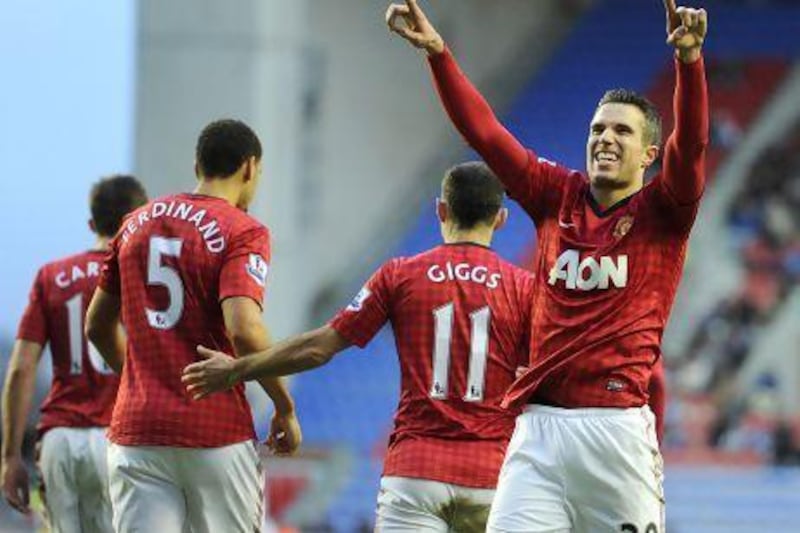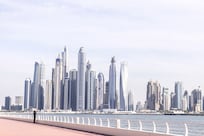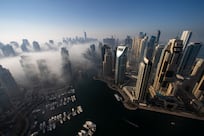In the later furlongs of a one-horse race, it can be hard to judge how pure is the thoroughbred streaking away at the front.
Is it striding to victory so easily by default? How good are the waning, panting creatures left behind?
These sorts of questions are being asked in eerie chorus by football followers across western Europe.
In Germany, Bayern Munich will this afternoon parade to their fans the Bundesliga Shield they secured a week ago, six matches before the end of the their league season.
It is the earliest coronation in the history of the German top flight, and one that provoked several jokes about the freakishness of picking up gold medals in freezing temperatures.
Typically, title celebrations take place on sun-kissed days in May. It has been unusually cold spring across Europe, positively polar at times. And the major domestic leagues of Europe have seldom looked so uniformly polarised.
Bayern's 21-point lead over second-placed Borussia Dortmund is staggering, suggesting a strong likelihood the existing record, 16 points, for the gap between winners and runners-up will be broken.
In England, Manchester United also seek a new landmark for domestic superiority, to break their own Premier League record, an 18-point gap, set in 2000.
Defeat against second-placed Manchester City in the derby last Monday reduced the margin between the clubs to 13 points.
It is hardly a seismic setback. Seven fixtures remain.
In Spain, Barcelona sit on a similar cushion, 13 points ahead of Real Madrid, with eight matches left.
In Italy, Juventus's margin is almost as commanding, 11 points clear of their closest chasers, Napoli, with seven games to go.
In France, Paris St Germain have been able to make encouraging calculations about their prospects since Lyon's form began to slump at the end of February.
Marseille are now their nearest rivals, and they lag PSG by nine points with seven Ligue 1 dates on the calendar.
How to interpret this pandemic of runaway pacesetters, in the five countries ranked by Uefa as homes of the top domestic leagues in Europe?
The first common theme concerns hunger.
Each of these league-leaders has a pent-up impatience for success. Bayern and United ended 2011/12 simmering because they had finished that campaign so close to big prizes.
United lost the Premier League on goal difference to City, who achieved the points they needed, on the last day, in stoppage time.
Bayern lost the Champions League final on penalties, collecting in their own stadium the third set of silver medals in a month. They had finished runners-up to Dortmund both in the German Cup and in the Bundesliga.
Barcelona were hungry, too.
The label of "greatest club side in the world" felt fraudulent when they ended up second in La Liga last year. Their reaction was turbo-charged: Barca reached the halfway mark of this campaign having dropped only two points of a possible 57.
As for PSG, the sheer scale of their recruitment spending, relative to other Ligue 1 clubs, transmitted the urgency of their Qatari owners to gate-crash the sport's elite at express speed.
Juventus, alone among these aristocratic champions-elect, are defending the title. But the 2012 scudetto was their first officially recognised league crown since 2003. Juve's drive, under coach Antonio Conte, to make up for their "lost" era has been conspicuous over 18 months.
Conte's first taste of a league defeat, after assuming the reins in the summer of 2011, came from his 49th Serie A match as Juve's manager.
At Bayern, president Uli Hoeness declares "we have set new standards". Heynckes, who came into the season knowing it will be his last in charge of Bayern - he discovered Pep Guardiola would be his successor in January - points to the key role of last summer's new signings, even if none of them had the starry quality of existing Bayern staffers like Franck Ribery, Arjen Robben, Manuel Neuer, Bastian Schweinsteiger or Philipp Lahm.
"Our transfer strategy worked out perfectly," Heynckes said.
Aspects of it were mirrored by others in the quintet of runaway leaders. Bayern, Juventus and PSG all added a young, dynamic central midfielder (Javi Martinez, Paul Pogba, Marco Verratti, respectively); Barcelona at least thought that is what they were getting in the 25-year-old Alex Song.
Bayern, like PSG, outspent all their compatriot clubs by a distance.
Like Manchester United and PSG, Bayern invested in strengthening the pool of strikers. Bayern, in Mario Gomez, and PSG, in Nene, already had the leading scorers in their divisions in 2012/13; only Robin van Persie, then of Arsenal, scored more Premier League goals than United's Wayne Rooney last term.
Still, Bayern signed both Mario Mandzukic and Claudio Pizarro, while keeping Gomez; PSG held onto Nene until January, by which time it had become clear that with the newcomers Zlatan Ibrahimovic and Ezequiel Lavezzi, and the France international Kevin Gameiro also on the roster, his employers were thinking in terms of a 22-man plan, not just a strong first XI.
Which was what Sir Alex Ferguson envisaged when Van Persie arrived at United. He said: "We are getting towards … the best combination of four strikers in Europe."
Ferguson was not hailing his quartet as better as individuals than Lionel Messi or Cristiano Ronaldo, but stressing the collective potential of Van Persie, Rooney, Chicharito Hernandez and Danny Welbeck ahead of a cluttered fixture-list.
Van Persie, Rooney and Hernandez have scored 39 goals between them; City's trio of front men, Edin Dzeko, Sergio Aguero and Carlos Tevez have 32.
And guess what? United have an eight-goal goal-difference over City, the club who beat them on goal-difference last May.
In getting Van Persie to say yes to United despite an enthusiastic pursuit of him by City, United al
o effectively weakened their chief rival, whose transfer plans were upset and hurriedly re-sketched after Van Persie's rejection. Arsenal's status as potential rivals was also diminished, as it has been, steadily, by City's predatory swoops on North London.
Poor Arsenal. Once they were United's fiercest Premier League competitors. They understand, as clearly as anybody, that as wealth becomes concentrated in fewer and fewer clubs, the very best players gravitate to a smaller number of employers.
In southern Europe, they recognise starkly that polarisation is long-term. In a financial climate of Europe-wide recession, the easy credit that aspirational, middle-ranking institutions like Spain's Valencia, or Italy's Lazio - both of whom won their leagues this century - used to access, has vanished.
A further factor is the new foreign investors, like the Abu Dhabi group behind City and the Qataris behind PSG.
They seek ready-made solutions in the transfer market, so they do their shopping among established giants, weakening them.
Juventus have good reason to thank PSG. The Paris club's lavish spending and admiration for Serie A expertise, meant Napoli (sellers of Lavezzi) and AC Milan (sellers of Ibrahimovic and Thiago Silva) became less formidable rivals.
Bayern, in the meantime, should say "danke" to United, for having prised Shinji Kagawa, so important to the winner of the 2011 and 2012 Bundesliga titles, away from Dortmund.
Juventus's Conte, meanwhile, almost sounded as if, amid his gloomy assessment on Wednesday of where his side stood in pan-European terms, he was feeling grateful to Bayern, for the lesson imparted by their 4-0 aggregate victory over Juve in the last eight of the Champions League.
It had given him a perspective.
"It makes me want to laugh when I hear Juventus described as two or three signings away from being European champions," Conte said. "Italian football is at a standstill." Juventus may be cantering towards their domestic finish line, but, in the Europe of one-horse races, there are purer thoroughbreds elsewhere.
Seasons that went to the wire
2000/01 Germany
Schalke 04, three points behind Bayern Munich at the start of the final day, came back from 2-0 down at home to Unterhaching to win 5-3. When the whistle blew, they stood top of the table on goal difference. But in Munich, four minutes of injury time remained. In the last of them, an equaliser from Patrik Andersson against Hamburg gave Bayern the title by a point.
2001/02 France
Lens led by a point going into their last match, away to second-place Lyon. Lyon went 2-0 up early, but when Jacek Bak scored, Lens’s hopes grew. Lyon, though, scored next, the 3-1 win giving the club the first of seven successive titles.
2006/07 Spain
Barcelona and Real Madrid were on 73 points on the final day. When Madrid went 1-0 down at home to Mallorca, their late-season push seemed to no avail. Barcelona roared to a 5-1 win at Nastic. Ten minutes from full time, it was only 1-1 for Real. By the whistle it became 3-1, delivering La Liga to Madrid, due to a better head-to-head record against Barca.
2007/08 Italy
Inter Milan stood one point ahead of Roma on the final day. Roma’s lead at Catania put them at an advantage as Inter were 0-0 at Parma. Zlatan Ibrahimovic came on to score twice for Inter. Once Catania equalised against Roma on 85 minutes, Inter’s defence of their scudetto was safe.
2011/12 England
Manchester United and Manchester City were tied on points on the last day, City ahead on goal difference. United won 1-0 away at Sunderland, while City were 2-1 down at home to 10-man Queens Park Rangers after 90 minutes. Stoppage-time goals from Edin Dzeko and Sergio Aguero gave City their first Premier League crown.
Follow us
[ @SprtNationalUAE ]






